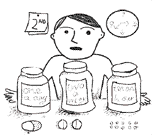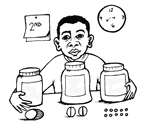Adapting i-Base materials
24 March 2016. Related: Advocacy and learning materials, Publications.
Why do we need treatment information?
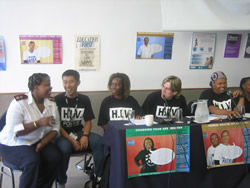
If you on the i-Base website, you most probably already understand why treatment information is so important.
The picture is from a TAC/i-Base treatment literacy workshop.
From the Treatment Action Campaign (TAC) in South Africa:
Many treatment activists have learned the science and medical treatment of HIV. Many of us educate our communities on these issues. The time when all we knew about medicines is that you take two of the pink pills every morning is over.
We must know our medicines by name, how they were found to be effective and how and where in the body they work. Their side effects and how they can be managed, how to monitor the safety of medicines. What food to take and not to take with them. That way we can feel we have some control over our health.
We must also follow new scientific research that sheds light on how best to use the drugs we take. All these things are part of what we call Treatment Literacy.
Treatment literacy is good for our health!
Some people living with HIV, health workers and institutions say that all this scientific information is too complicated and confusing. We don’t agree.
- HIV positive people on treatment (ART) who had more information were more likely to have an undetectable viral load.
- HIV is a complicated disease. Understanding its complexity will help us to manage it. An American study showed that treatment literacy led to better health.
Making things make more sense
Rather than feeling bossed about when doctors tell us what to do, we are more likely do something when we understand why. With a little information about drug resistance, for example, aherence makes perfect sense. Information about side effects will help mange or avoids them rather than causing you to be scared.
Unfortunately the opposite is also true as Thomas Cai from AIDS Care China explained:
In one village, almost 90% of people stopped taking the ARVs within a short period of time. The main reason is because of the way they distributed the drugs without any education. They just passed them out with no information. So some of the people had the side effects and the others watched them and stopped. So there is a lack of understanding and no treatment literacy and rumours start to come out of the village, “the government is trying to poison us.” There is a lot of misunderstanding.
The experience is the same everywhere. Programmes that provide ARVs to people without treatment information have low adherence levels. People are vulnerable to misinformation and have poor treatment outcomes.
Adapting i-Base materials
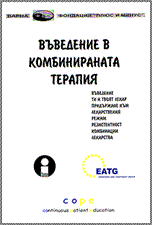
Sometimes it is not immediately obvious how information produced in a western European country can be relevant in so many different countries. The UK has a National Health Service that provides free treatment; in other countries access to treatment and resources are not the same.
As Milen Chavrov from the Plus and Minus Foundation, Bulgaria told us:
The first booklet from i-Base that I saw was ‘Introduction to combination therapy’ and that was in 2001. As a person living with HIV/AIDS for a long period of time and someone who is a patient relying on the medical services in Bulgaria, many of the things that I read about seemed strangely disconnected from my reality, like science fiction. While sections like ‘You and your doctor’, ‘Your rights as a patient’, and ‘Things you can do to help’ even annoyed me.
But:
Reading the booklet for a second time I realised that these best practices and recommendations should become a reality in my country as well. That we could adapt them and use what was relevant. Thus together with the well systematised answers to main questions that were concerning me as a patient with HIV, this booklet gave me the opportunity to pay attention to the complex of aspects that a quality medical service means. It made me become an activist.
And after the first booklet, the other i-Base treatment guides were produced in Bulgarian. Those booklets became the basis for the education of PLWHAs in Bulgaria. Additionally, the materials were of great interest to medical students and medical professionals. With these translations were filled a wider educational role than just informing patients – this filled a gap in Bulgaria where there was no information in our own language.
Plus and Minus Foundation website
Information can be very useful in advocating for treatment
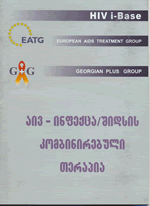
David Ananiashvii from the Georgian Plus Group, Georgia describes his experiences:
The Georgian version of Introduction to Combination therapy that we first made in 2001 was the first information for HIV positive people in my country. We learnt many new things about treatment. We caused quite a scandal as we included information about generics and one important doctor in Georgia is a representative of Roche and another is a very important person at GSK. Then we started interactions with CIPLA, buying generics.
The booklets are distributed by post, through the AIDS centre, ASOs and doctors give them to patients.
You don’t have to be rich…
Poor people in so-called poor countries can use antiretrovirals just as effectively as rich countries. This is a fact. It has been shown in every country where people use treatment.
What’s more, everyone can learn about their medicines.
Nontsikelo Zwedala, a TAC activist living with HIV, responding to an insult by a member of president Bush’s administration to poor people in Africa, said:
I want to tell the world that I live in a shack in Phiillippi in Cape Town. I do not have a degree from a university. But I want to tell the world today that I know the names of my medicines.
I received ARVs from a trial at the Desmond Tutu Medical Centre. I take nevirapine, AZT and 3TC. I know how they work. I know nevirapine can cause liver damage so my doctor must monitor my liver function. I know AZT can give me anaemia, I know all their side effects. Two months into my treatment I had liver problems. My doctor picked it up and managed it. I am alive today and didn’t die. I know what ARVs have done for me. I could not eat any more with thrush and oral herpes. I was losing too much weight.
I do not accept this insult from Mr Natzios. That poor people cannot tell time. That we are too poor to be able to learn to look after our own health. That is an insult to us and we are asking the Bush government to tell Mr Natzios to apologise to us…
i-Base generic booklet
Last year we produced a small handbook based on the i-Base Introduction to Combination Therapy that focuses on the four main combinations recommended in the latest WHO treatment guidelines. It also comments on how HIV is treated in other countries. We produced it especially to be adapted for different settings.
There are two versions already and more in the pipeline…
Namibia
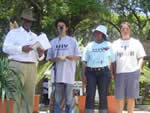
Delme Cupido and his co-workers at the AIDS Law Unit in Namibia produced the first version. He wrote to us:
Hi there,
The treatment booklet was launched at an event hosted by Lironga Eparu (the Namibian PLWHA group) and the Prime Minister of Namibia – an achievement in itself. It will be translated and updated early next year (given that our guidelines have changed for PMTCT and we have more sites providing ARVs coming online all the time).
The photo is of the PM Theo-Ben Gurirab, Emma Tuahepa (the first PLWHA to publicly disclose her status and the head of Lironga Eparu), and the chap in the ill-fitting T-shirt is moi.
Warmest regards, and thank you again for all your assistance. Can you believe that this is the first proper attempt in Namibia at providing the community with this type of information?! Pats on backs all round.
Love
Delme
Uganda

William Babumba’s group Community Health and Information Network (CHAIN) for the Great Lakes countries (Uganda, Kenya, Rwanda, Tanzania, Burundi and Democratic Republic of Congo). He wrote:
It’s evident that treatment literacy is still very much lacking in the above countries. CHAIN in partnership with HIV i-Base in London and all key stakeholders in the region have come together to produce this publication.
This has been informed by the treatment needs, which were identified from the treatment empowerment workshops we held in the Great Lakes countries over the past two years.
South Africa
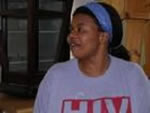
Sipho Mthathi and TAC produced ARVs in Our Lives.
We used the i-Base technical information – after all 3TC is 3TC wherever we are – and then wove in stories from our community to illustrate the information with experiences from TAC comrades. We include sections about our National Treatment Plan and advocating for treatment. i-Base treatment workers also come to Cape Town to work with us on materials and help with training.
And there have been several adaptations of our training manual…
The i-Base training manual Treatment training for advocates comprises eight 2-hour modules and covers CD4, viral load and other monitoring tests, combination therapy and side effects, opportunistic infections, pregnancy and IV drug users.
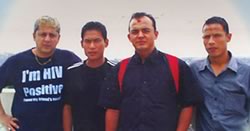
Rajiv Kafle from Nava Kiran Plus in Prenana, Nepal wrote to us:
Dear Polly,
When we started advocating for access to treatment – specially access to ARVs very few people living with HIV knew about ARV, let alone use it. Most of them were told that it is some expensive drugs with too many side effects than healing properties. They were told so more for political reasons than for science.
When I first started speaking with people living with HIV about ARVs and a need for advocating for access to it I use to remind them a bit from the Nepali history.
Before the dawn of democracy in the early sixties, Rana’s ruled the country for 107 years. At that time they had made a rule that no one except their own children were allowed to go to school. The Ranas thought that if people get educated they will revolt against their autocracy and they will loose power.
This would always be relevant in the context of treatment access too. Those who were in power and those who were supporting HIV/AIDS programme in Nepal also feared that if PLWHs learn about ARVs they will demand it morethan anything else. Thus treatment literacy was very important for an effective treatment access campaign. It was also important as people gradually started rolling out the treatment programmes.
We always believed that we already have enough resources to adapt from. So we decided to adapt the i-Base treatment training manual. There is only one point that we always took into consideration while translating the whole manual. We read it again and again and made sure we understood it correctly. We made sure everyone will understand it correctly.
And then now we are proud to present yet another version of the Treatment Training manual. In Nepali.
Rajiv
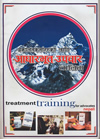
Learn from our mistakes!

Things don’t always go smoothly straight away though, but we can learn from our mistakes. Svilen Konov from Plus and Minus, Bulgaria recalls:
What I remember is that when we were translating the Introduction to Combination Therapy, we forgot to include page numbers. The printers didn’t add them either. Perhaps, they thought that this is what we wanted. I was mortified. Just imagine, how you work with somebody who comes to you for a consultation and you have to say ‘Can you please turn to the second page after the middle. The info is there…”
Well, we learnt our lesson, now we know how to do the things on our own and properly and isn’t that exactly what we should call empowerment?
Adapting materials – some useful tips
- If something is not locally relevant change it.
- Sometimes it is appropriate to refer to how HIV is treated in other countries. Even if a drug or test is not available now it can be helpful with our lobbying to know about them.
- Shorter sentences are always easier to read.
- Shorter everyday words with fewer syllables will be easier to understand.
- Using only two or three sentences in each paragraph will be easier to read than large solid paragraphs.
- There is no point in speaking to your readers in a language that they wouldn’t understand.
- Some medical terms used in the English version may not have exact translations in every language – you may have to invent new words that explain these terms, just as advocates and researchers invented terms in English.
- Personal stories can make the information much more vivid and real.
- Sometimes tips to help can really vary from culture to culture. For example in the English version of Introduction to combination therapy we suggested peppermint tea to help combat nausea, in the Bulgarian version they suggest dill tea.
- Remember page numbers!
The Namibians didn’t just adapt the words…
